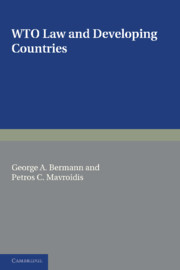Book contents
- Frontmatter
- Contents
- Contributors
- Developing Countries in the WTO System
- 1 The Legal Status of Special and Differential Treatment Provisions under the WTO Agreements
- 2 Trade Preferences to Small Developing Countries and the Welfare Costs of Lost Multilateral Liberalization
- 3 China in the WTO 2006: “Law and Its Limitations” in the Context of TRIPS
- 4 Developing Countries in the WTO Services Negotiations: Doing Enough?
- 5 Developing Countries and the Protection of Intellectual Property Rights: Current Issues in the WTO
- 6 Participation of Developing Countries in the WTO – New Evidence Based on the 2003 Official Records
- 7 Developing Countries and GATT/WTO Dispute Settlement
- 8 Representing Developing Countries in WTO Dispute Settlement Proceedings
- 9 Compensation and Retaliation: A Developing Country's Perspective
- 10 A Preference for Development: The Law and Economics of GSP
- 11 The GSP Fallacy: A Critique of the Appellate Body's Ruling in the GSP Case on Legal, Economic, and Political/Systemic Grounds
- 12 Is the WTO Doing Enough for Developing Countries?
- Index
11 - The GSP Fallacy: A Critique of the Appellate Body's Ruling in the GSP Case on Legal, Economic, and Political/Systemic Grounds
Published online by Cambridge University Press: 04 August 2010
- Frontmatter
- Contents
- Contributors
- Developing Countries in the WTO System
- 1 The Legal Status of Special and Differential Treatment Provisions under the WTO Agreements
- 2 Trade Preferences to Small Developing Countries and the Welfare Costs of Lost Multilateral Liberalization
- 3 China in the WTO 2006: “Law and Its Limitations” in the Context of TRIPS
- 4 Developing Countries in the WTO Services Negotiations: Doing Enough?
- 5 Developing Countries and the Protection of Intellectual Property Rights: Current Issues in the WTO
- 6 Participation of Developing Countries in the WTO – New Evidence Based on the 2003 Official Records
- 7 Developing Countries and GATT/WTO Dispute Settlement
- 8 Representing Developing Countries in WTO Dispute Settlement Proceedings
- 9 Compensation and Retaliation: A Developing Country's Perspective
- 10 A Preference for Development: The Law and Economics of GSP
- 11 The GSP Fallacy: A Critique of the Appellate Body's Ruling in the GSP Case on Legal, Economic, and Political/Systemic Grounds
- 12 Is the WTO Doing Enough for Developing Countries?
- Index
Summary
abstract: The principal aim of this reflection paper is to provide a critique of the Appellate Body's reasoning and its ultimate conclusion in the EC – Tariff Preferences dispute. Because this is a reflection paper, it briefly examines some of the problems with the Appellate Body's ruling on legal, economic, and political/systemic grounds against the backdrop of the Seminar on WTO Law participants who presented papers on this topic specifically, and those participants who offered more general comments on the soundness of special and differential treatment for developing countries in today's multilateral trading system. After putting forth the argument that the Appellate Body's ruling cannot be supported on either legal and economic grounds, the reflection paper advances the argument that the decision is also untenable on broader political/systemic grounds, primarily because it maintains the status quo and squanders an opportunity to give WTO Members the impetus to thoroughly review whether the Enabling Clause, in whole or in part, still fulfills its original mandate.
Introduction
Background to the Dispute
On April 7, 2004, the Appellate Body of the World Trade Organization (WTO) issued its much anticipated report in the EC – Tariff Preferences dispute.
- Type
- Chapter
- Information
- WTO Law and Developing Countries , pp. 306 - 323Publisher: Cambridge University PressPrint publication year: 2007



